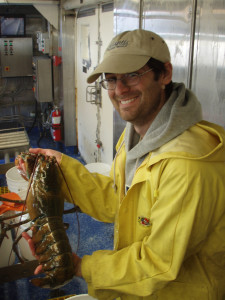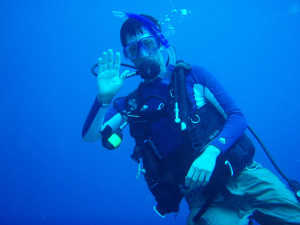
A graduate student at the University of Miami is the 2014 NOAA Fisheries Population Dynamics fellow.
Matthew Nuttall, a doctoral student at University of Miami Rosenstiel School of Marine and Atmospheric Science, has received the NOAA National Marine Fisheries Population Dynamics fellowship.
The fellowship provides up to three years of funding to outstanding Ph.D. candidates who study ways to improve the sustainability of fish stocks that are commercially or recreationally valuable.
Nuttall decided to apply after his fiance, a 2009-2012 population dynamics fellow, convinced him to spend his spring vacation conducting a spring bottom trawl survey on a NOAA research vessel.
“I quickly realized how prestigious the recognition was and the benefits associated with the opportunity,” he said. “I knew I was going to apply when I first started formulating ideas for my dissertation.”
Nuttall’s research is focused on determining what effect, if any, the Gulf of Mexico ecosystem has on the Gulf menhaden, a small but economically important fish that supports more than a billion pounds of commercial landings annually. Nuttall plans to use ecosystem models to explore how factors such as low oxygen levels, harmful algal blooms, and predator and prey species interact with the Gulf menhaden.
“My hope is that my research will contribute to the next stock assessment for Gulf menhaden, furthering my experience in the field as well as introducing me to some of the individuals involved in the assessment process,” he said.
Nuttall first became interested in marine research as a youth. He spent his early years in Miami, where he would spend most weekends at the beach. When he was 10, his family started moving around for his father’s job. Most of those places did not have local beaches.

Nuttall said he grew more fond of the ocean when he moved away from his Miami home. The time away fostered his appreciation of the marine environment.
“It was only during our annual cruise vacations that I was able to enjoy the marine environment. And, as they say, absence makes the heart grow fonder.”
Nuttall also earned his bachelor’s degree in marine science and biology at RSMAS, and his master’s degree in marine and atmospheric science at Stony Brook University in New York state. While in graduate school, he taught biology, limnology and mathematics for marine scientists to undergraduates.
“My life-long career goal is to become a stock assessment scientist,” Nuttall said. “Of personal interest to me is how ecological processes interact to affect ecosystem structure, function and the sustainability of ecosystem services.”



